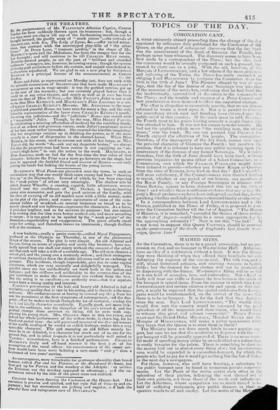A new burletta—really a petite comedy--called Naval Engagements, produced at
the Olympic on Thursday, is one of the pleasantest things of the season. The plot is very simple. An old Admiral and his son, living on terms of equality and amity like brothers, have mu. tually agreed that one shall not marry without the consent of the othef, and that each will take a wife of a suitable age. The old man chooses a school-girl, and the young one a matronly widow ; and their stratagems to extricate themselves from the double dilemma end in an exchange of partners. The incidents, though improbable, give rise to some capital situations, which are very naturally and delightfully managed. The parallel cases are too methodically set forth both in the action and dialogue ; and this stiffness and artificiality in the construction of the plot contribute to make the denouement too evident from the first. But the acting is so excellent—so perfectly true—that tl e separate scenes have a strong reality and interest. PARREN'S personation of the hale and hearty old Admiral is full of cordiality,—a quality that is rare in his acting, and is thereto' e the more welcome. His embarrassment at having to conceal any thin g from his son, his uneasiness at the first symptoms of estrangement, :.rid the des. penite effort he makes to break through the ice of restraint, i evelop the trash and kindly character completely. Equally good, and more tick- ling to the audience, was his reception of his son's intend, d, and the gradual change from aversion to liking, till he ends with sup- planting his young rival. Mrs. ORGER'S share in this int( rview, and indeed her whole performance of the widow-bride, is charn ing, for its bland and genial tone : the self- possessed manner of the disr eet woman of the world, unalloyed by sordid or selfish feelings, makes this a very agreeable character. The girl marrying an old fellow merely be- cause he is an Admiral, is a character too much out of na ure for the reserit day, and in other respects it is not particularly well suited to VESTRIS : nevertheless, hers is a finished performance. CHARLES MATIIEwS'S lively and offhand manner is the best p: rt of his assumption of the naval officer : his consciousness of the smart uni-
form would have been more befitting a new-made " y" than a lieutenant of two years' service.


























 Previous page
Previous page